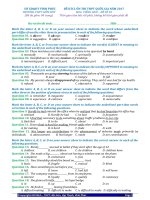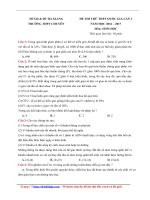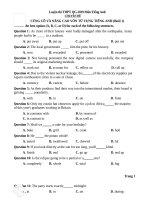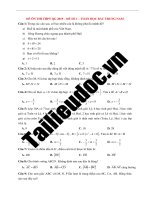ĐỀ 1 lUYỆN THI THPT QG 2019
Bạn đang xem bản rút gọn của tài liệu. Xem và tải ngay bản đầy đủ của tài liệu tại đây (865.38 KB, 8 trang )
��������������������������������������������������������������������������������������������������������������������������������������������������������������������������������������������������������������������������������������������������������������������������������������������������������������������������������������������������������������������������������������������������������������������������������������������������������������������������������������������������������������������������������������������������������������������������������������������������������������������������������������������������������������������������������������������������������������������������������������������������������������������������������������������������������������������������������������������������������������������������������������������������������������������������������������������������������������������������������������������������������������������������������������������������������������������������������������������������������������������������������������������������������������������������������������������������������������������������������������������������������������������������������������������������������������������������������������������������������������������������������������������������������������������������������������������������������������������������������������������������������������������������������������������������������������������������������������������������������������������������������������������������������������������������������������������������������������������������������������������������������������������������������������������������������������������������������������������������������������������������������������������������������������������������������������������������������������������������������������������������������������������������������������������������������������������������������������������������������������������������������������������������������������������������������������������������������������������������������������������������������������������������������������������������������������������������������������������������������������������������������������������������������������������������������������������������������������������������������������������������������������������������������������������������������������������������������������������������������������������������������������������������������������������������������������������������������������������������������������������������������������������������������������������������������������������������������������������������������������������������������������������������������������������������������������������������������������������������������������������������������������������������������������������������������������������������������������������������������������������������������������������������������������������������������������������������������������������������������������������������������������������������������������������������������������������������������������������������������������������������������������������������������������������������������������������������������������������������������������������������������������������������������������������������������������������������������������������������������������������������������������������������������������������������������������������������������������������������������������������������������������������������������������������������������������������������������������������������������������������������������������������������������������������������������������������������������������������������������������������������������������������������������������������������������������������������������������������������������������������������������������������������������������������������������������������������������������������������������������������������������������������������������������������������������������������������������������������������������������������������������������������������������������������������������������������������������������������������������������������������������������������������������������������������������������������������������������������������������������������������������������������������������������������������������������������������������������������������������������������������������������������������������������������������������������������������������������������������������������������������������������������������������������������������������������������������������������������������������������������������������������������������������������������������������������������������������������������������������������������������������������������������������������������������������������������������������������������������������������������������������������������������������������������������������������������������������������������������������������������������������������������������������������������������������������������������������������������������������������������������������������������������������������������������������������������������������������������������������������������������������������������������������������������������������������������������������������������������������������������������������������������������������������������������������������������������������������������������������������������������������������������������������������������������������������������������������������������������������������������������������������������������������������������������������������������������������������������������������������������������������������������������������������������������������������������������������������������������������������������������������������������������������������������������������������������������������������������������������������������������������������������������������������������������������������������������������������������������������������������������������������������������������������������������������������������������������������������������������������������������������������������������������������������������������������������������������������������������������������������������������������������������������������������������������������������������������������������������������������������������������������������������������������������������������������������������������������������������������������������������������������������������������������������������������������������������������������������������������������������������������������������������������������������������������������������������������������������������������������������������������������������������������������������������������������������������������������������������������������������������������������������������������������������������������������������������������������������������������������������������������������������������������������������������������������������������������������������������������������������������������������������������������������������������������������������������������������������������������������������������������������������������������������������������������������������������������������������������������������������������������������������������������������������������������������������������������������������������������������������������������������������������������������������������������������������������������������������������������������������������������������������������������������������������������������������������������������������������������������������������������������������������������������������������������������������������������������������������������������������������������������������������������������������������������������������������������������������������������������������������������������������������������the other things they
learn to do without being taught – to talk, run, climb, whistle, ride a bicycle – compare their own
performances with those of more skilled people, and slowly make the needed changes. But in school we
never give a child a chance to find out his mistakes for himself, let alone correct them. We do it all for him.
We act as if we thought that he would never notice a mistake unless it was pointed out to him, or correct it
Hệ thống giáo dục HOCMAI
Tổng đài tư vấn: 1900 6933
- Trang | 3 -
Hocmai.vn – Website học trực tuyến số 1 tại Việt Nam
Tham gia nhóm luyện thi môn Tiếng Anh cùng cô Hương Fiona
BỘ 50 ĐỀ NĂM 2019
& Page Hương Fiona để cập nhật nhiều thông tin bổ ích
unless he was made to. Soon he becomes dependent on the teacher. Let him do it himself. Let him work out,
with the help of other children if he wants it, what this word says, what the answer is to that problem,
whether this is a good way of saying or doing this or not.
If it is a matter of right answers, as it may be in mathematics or science, give him the answer book.
Let him correct his own papers. Why should we, teachers, waste time on such routine work? Our job should
be to help the child when he tells us that he can’t find the way to get the right answer. Let’s end all this
nonsense of grades, exams, and marks. Let us throw them all out, and let the children learn what all educated
persons must someday learn, how to measure their own understanding, how to know what they know or do
not know.
Let them get on with this job in the way that seems most sensible to them, with our help as school
teachers if they ask for it. The idea that there is a body of knowledge to be learnt at school and used for the
rest of one’s life is nonsense in a world as complicated and rapidly changing as ours. Anxious parents and
teachers say, “But suppose they fail to learn something essential, something they will need to get on in the
world?” Don’t worry! If it is essential, they will go out into the world and learn it.
Question 16: What does the author think is the best way for children to learn things?
A. By listening to explanations from skilled people
B. By copying what other people do
C. By asking a great many questions
D. By making mistakes and having them corrected
Question 17: The passage suggests that learning to speak and learning to ride a bicycle are __________.
A. basically the same as learning other skills
B. basically different from learning adult skill
C. not really important skills
D. more important than other skills
Question 18: What does the author think teachers do which they should not do?
A. They give children correct answers.
B. They allow children to mark their own work.
C. They encourage children to copy from one another.
D. They point out children’s mistakes to them.
Question 19: The word “those” in paragraph 1 refers to __________.
A. skills
B. performances
C. changes
D. things
Question 20: According to paragraph 1, what basic skills do children learn to do without being taught?
A. reading, talking, and hearing
B. talking, climbing, and whistling
C. running, walking, and playing
D. talking, running, and skiing
Hệ thống giáo dục HOCMAI
Tổng đài tư vấn: 1900 6933
- Trang | 4 -
Hocmai.vn – Website học trực tuyến số 1 tại Việt Nam
Tham gia nhóm luyện thi môn Tiếng Anh cùng cô Hương Fiona
BỘ 50 ĐỀ NĂM 2019
& Page Hương Fiona để cập nhật nhiều thông tin bổ ích
Question 21: Exams, grades and marks should be abolished because children’s progress should only be
estimated by __________.
A. parents
B. educated persons
C. the children themselves D. teachers
Question 22: The word “essential” in paragraph 3 is closest in meaning to __________.
A. wonderful
B. important
C. complicated
D . difficult
Question 23: The author fears that children will grow up into adults who are __________.
A. too critical of themselves
B. unable to use basic skills
C. too independent of others
D. unable to think for themselves
Mark the letter A, B, C, or D on your answer sheet to indicate the word whose underlined part differs
from the other three in pronunciation in each of the following questions.
Question 24:
A. impressed
B. abolished
C. influenced
D. heightened
Question 25:
A. savour
B. devour
C. favour
D. flavour
Mark the letter A, B, C or D on your answer sheet to indicate the correct answer to each of the following
questions.
Question 26: The babysitter has told Billy’s parents about his __________ behavior and how he starts
acting act as soon as they leave home.
A. focus-seeking
B. meditation- seeking
C. attention-seeking
D. concentration-seeking
Question 27: __________ as a masterpiece, a work of art must transcend the ideals of the period in which it
was created.
A. In order to be ranking B. Ranking
C. Being ranked
D. To be ranked
Question 28: Every __________ piece of equipment was sent to the fire.
A. disposable
B. consumable
C. spendable
D. available
Question 29: Smith had a lucky escape. He __________ killed.
A. should have been
B. would have been
C. must have been
D. could have been
Question 30: Neither of the boys came to school yesterday, __________?
A. didn’t he
B. does he
C. did he
D. doesn’t he
Question 31: A good leader in globalization is not to impose but __________ change.
A. facilitate
B. show
C. cause
D. oppose
Question 32: The old man warned the young boys __________ in the deep river.
A. not to swimming
B. don’t swim
C. to swim
D. against swimming
Question 33: His father used to be a __________ professor at the university. Many students worshipped
him.
A. distinguishing
Hệ thống giáo dục HOCMAI
B. distinct
C. distinctive
Tổng đài tư vấn: 1900 6933
D. distinguished
- Trang | 5 -
Hocmai.vn – Website học trực tuyến số 1 tại Việt Nam
Tham gia nhóm luyện thi môn Tiếng Anh cùng cô Hương Fiona
BỘ 50 ĐỀ NĂM 2019
& Page Hương Fiona để cập nhật nhiều thông tin bổ ích
Question 34: If Tim __________ so fast, his car wouldn’t have crashed into a tree.
A. haven’t driven
B. didn’t drive
C. drives
D. hadn’t driven
Question 35: Most of the __________ in this workshop do not work very seriously or productively.
A. rank and file
B. tooth and nail
C. eager beavers
D. old hand
Question 36: Not only __________ in the field of psychology but animal behavior is examined as well.
A. is human behavior studied
B. is studied human behavior
C. human behavior
D. human behavior is studied
Question 37: Luckily, the rain __________ so we were able to play the match.
A. watered down
B. gave out
C. got away
D. held off
Mark the letter A, B, C, or D to indicate the word or phrase that is CLOSEST in meaning to the
underlined part in each of the following questions.
Question 38: He may be shy now, but he’ll soon come out of his shell when he meets the right girl.
A. hole
B. become confident
C. shed
D. become shy
Question 39: The only cure for alcoholism is complete abstinence from alcohol.
A. sickness
B. pretension
C. avoidance
D. absence
Mark the letter A, B, C or D on your answer sheet to indicate the underlined part that needs correction in
each of the following questions.
Question 40: He bought a lot of books, none of them he has ever read.
A. bought
B. none
C. them
D. has ever read
Question 41: There is few evidence that the children in language classrooms learn foreign languages any
better than adults in similar classroom situation.
A. few evidence
B. in language classrooms
C. any better
D. classroom situation
Question 42: The theory isn’t sounding persuasive anymore because it had been opposed by many scholars.
A. isn’t sounding
B. anymore
C. had been opposed
D. scholars
Read the following passage and mark the letter A, B, C, or D on your answer sheet to indicate the word(s)
that best fits each of the numbered blanks from 43 to 47
Around 200 million people are employed in tourism worldwide, making it the largest industry in the
modern global economy. It is estimated that three-quarters of a billion people go on holiday each year, and
industry planners expect this figure to double (43) __________ 2020. Some of the biggest beneficiaries are
less developed countries, where it is often their main source of income.
Hệ thống giáo dục HOCMAI
Tổng đài tư vấn: 1900 6933
- Trang | 6 -
Hocmai.vn – Website học trực tuyến số 1 tại Việt Nam
Tham gia nhóm luyện thi môn Tiếng Anh cùng cô Hương Fiona
BỘ 50 ĐỀ NĂM 2019
& Page Hương Fiona để cập nhật nhiều thông tin bổ ích
(44) __________, along with the economic benefits, this mass movement of people has resulted in
environment. People often forget the damage caused by carbon emissions from aircraft, (45) __________
contribute directly to global warming. Deforestation has cleared land in order to build hotels, airports and
roads, and this has destroyed wildlife. In some areas, water shortages are now common because of the need
to fill swimming pools and water golf courses for tourists. By pushing up prices for goods and services,
tourism can also be harmful to people living in tourist destinations.
In response to these (46) __________, some travel operators now offer environment-friendly
holidays. Many of these aim to reduce the negative effects of tourism by (47) __________ only hotels that
have invested equipment to recycle waste and use energy and water efficiently. Increasingly, tourists are also
being reminded to show respect for customs of the people whose countries they are going to visit, and to
support local businesses, such as restaurants and shops which depend on tourism for their main income.
Question 43:
A. before
B. until
C. by
D. in
Question 44:
A. However
B. Therefore
C. Yet
D. In
Question 45:
A. what
B. which
C. whatever
D. that
Question 46:
A. concerns
B. priorities
C. scenarios
D. issues
Question 47:
A. voting
B. promoting
C. empowering
D. permitting
Mark the letter A, B, C, or D on your answer sheet to indicate the sentence that is closest in meaning to
each of the following questions.
Question 48: It was not until after I got home that I realized I had not set the burglar alarm in the office.
A. Fortunately, I realized that I hadn't set the burglar alarm just before I left for home; otherwise, I would
have had to travel all the way back to the office.
B. On the way home, I suddenly realized that I had forgotten to turn on the burglar alarm in the office.
C. I didn’t turn the burglar alarm on before I left the office, but I only became aware of this after I’d
arrived home.
D. I wish I had realized before I arrived home that I hadn't turned on the burglar alarm in the office, then
it would have been easier to go and set it.
Question 49: Phil wanted to be separated from his family on the business trip for less time than he was on
the last.
A. As he had enjoyed being away from his family for such a long time on his last business trip, Phil
hoped that this trip would be even longer.
B. Phil knew that the business trip he was soon to take would keep him away from his family for less
time than the previous one
C. On this business trip, Phil hoped that he would not be away from his family for as long a time as he
had been on the previous one.
Hệ thống giáo dục HOCMAI
Tổng đài tư vấn: 1900 6933
- Trang | 7 -
Hocmai.vn – Website học trực tuyến số 1 tại Việt Nam
Tham gia nhóm luyện thi môn Tiếng Anh cùng cô Hương Fiona
BỘ 50 ĐỀ NĂM 2019
& Page Hương Fiona để cập nhật nhiều thông tin bổ ích
D. No longer wanting to take lengthy business trips because they separated him from his family, Phil
preferred not to go on any at all.
Question 50: When there is so much traffic on the roads, it is sometimes quicker to walk than to go by car.
A. The traffic is always so heavy that you'd better walk to work; it’s quicker.
B. There is so much traffic these days that it is more pleasant to walk than to drive.
C. During rush hours, walking gives me much more pleasure than driving in the heavy traffic.
D. It is faster to walk than to drive in the heavy traffic at certain time of the day.
Hệ thống giáo dục HOCMAI
Tổng đài tư vấn: 1900 6933
- Trang | 8 -









